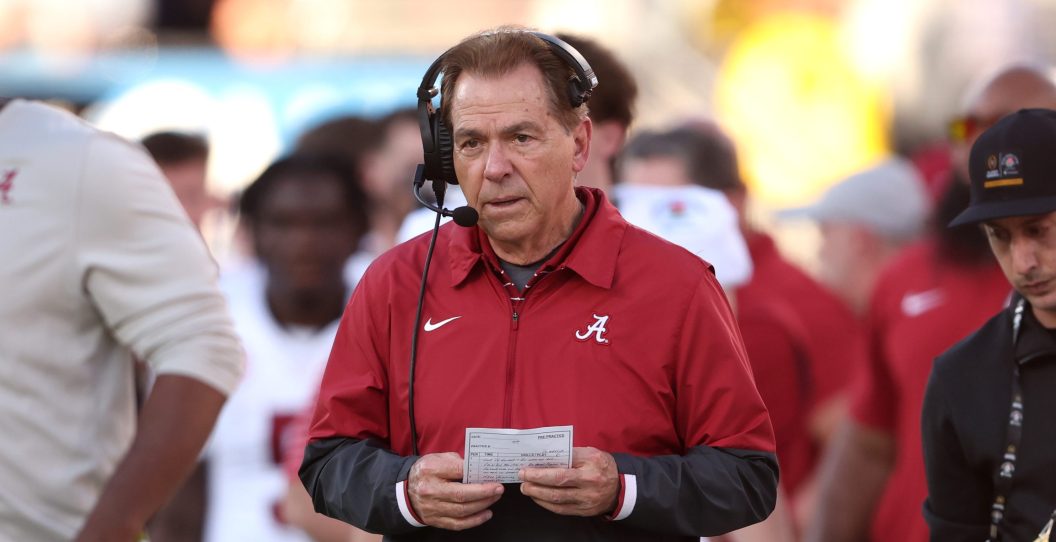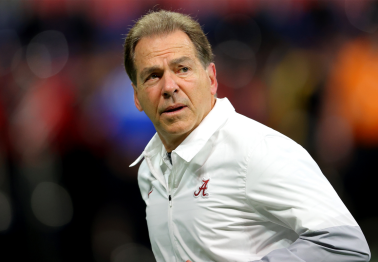With Nick Saban stepping away from college football and the Alabama Crimson Tide, we're beginning to learn more about his belief system regarding the sport.
Sitting down with ESPN's Chris Low, Saban clarified that while he's not coaching anymore, he's not retired from "doing his part to help bring some reform, uniformity and "common sense" to the sport.
Nick Saban says he wants to do his part in helping bring reform, uniformity, and ?common sense? to College Football.
He said: ?What we have now is not College Football, not College Football as we know it. You hear somebody use the word ?student-athlete.? That doesn?t exist.?? pic.twitter.com/yBDbMMR6IL
— College Football Report (@CFBRep) February 22, 2024
"If my voice can bring about some meaningful change, I want to help any way I can, because I love the players, and I love college football," Saban told ESPN. "What we have now is not college football — not college football as we know it. You hear somebody use the word 'student-athlete.' That doesn't exist."
One aspect of college football that Saban somewhat talked about but is now voicing his concerns about even more strongly is the NIL landscape. He admitted that if he came out with his critiques of the system, it would appear "self-serving".
"I'm not really looking for a job, but I do know I'd like to impact college football the best way I can, whether it's being a spokesperson or anything else," Saban said. "Listen, I'm for the players. It's not that I'm not for the players. I want to see the players have a great quality of life and be able to create value for themselves. But we've gone to nobody talking about education, nobody talking about creating value for their future, to talking only about how much money can I make while I'm in college.
"I think the consequence of this could come down the road when some of these guys get 28 and 29 years old that maybe they didn't prepare themselves for when they can't play football anymore, which is what you should do when you go to college."
Saban said he wants players to get paid based on their name, image, and likeness. He doesn't want to see other sports programs get cut.
"But what you have now isn't name, image and likeness. A collective has nothing to do with name, image and likeness," Saban said.
Saban mentioned the idea of a structure created in-house and removed from "donor-based collectives."
"People can give money to the university again and get a tax deduction for doing it, and the university in some kind of way shares, whether it's share revenue, whether it's buying marketing rights, which is a possibility," Saban suggested.
While the answers regarding how best to approach name, image, and likeness funds are certainly unclear, it's exciting to see Saban voicing his opinion more strongly. In contrast, there's no official college football commissioner. Saban profiles someone who would be excellent for this "imaginary" job, even if he disagrees.
"They [SEC commissioner Greg Sankey and Alabama athletic director Greg Byrne] would be more qualified [to serve in a college football commissioner's role] than I am. They're in it every day and know all the issues," Saban said. "That's why I'm hesitant to come up with a firm solution because you don't know the consequences of the solution relative to, 'All right, do we have to pass antitrust laws to be able to do it this way? What does it all entail?'
"It's one thing to come up with a solution. It's another thing to implement it. I'm just here to help," Saban finished.
Saban began his coaching career in 1973 as a graduate assistant at Kent State. As a head coach in college football, he went 292-71-1, 19-12 in bowl games, 9-5 in tournaments, and after a brief stint in the NFL, 15-17.
He won seven national championships, including one at LSU and six with Alabama. He also won 11 SEC championships, 15 SEC Western Division titles, and a litany of coaching awards.
We'll watch to see Saban's role in college football moving forward.

